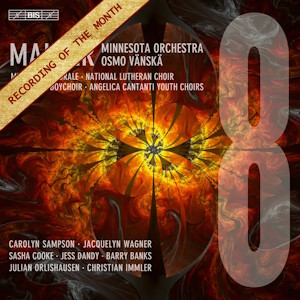
Gustav Mahler (1860-1911)
Symphony No 8 in E-flat major (1906)
Details of singer soloists beneath review
Minnesota Chorale; National Lutheran Choir; Minnesota Boychoir; Angelica Cantanti Youth Choir
Minnesota Orchestra/Osmo Vänskä
rec. 10-12 (live) & 14-16 (studio) June 2022, Orchestra Hall, Minneapolis, USA
Texts in Latin & German with English translations
BIS BIS2496 SACD [83]
This is presumably the penultimate release in Osmo Vänskä’s ongoing series of recordings of Mahler’s symphonies, as only the Third, which was recorded last November, remains to be issued. The mixed reception from MusicWeb reviewers given to them hitherto would suggest that Vänskä is not regarded, on this site at least, as an entirely successful interpreter of that music, but this latest is the best yet.
The recording is a composite derived from the live performances and patching sessions, and an immediate advantage is that despite running to over 83 minutes the whole symphony has been fitted onto one disc, attractively presented in a cardboard pack with thoughtful and informative notes by Jeremy Barham, texts and biographies.
First impressions are very good; kudos is due to the massed choir, which is sharp and impassioned, enunciating very clearly – perhaps precisely because they were obliged to wear masks at the time of recording – and the team of soloists is admirably homogeneous, their voices cutting through the thick choral and orchestral textures. Sonic balances are superb; I don’t think I have ever heard this amount of detail emerging so clearly – examples in point being the contributions of the mandolin and organ in the monumental peroration to Part II. Carolyn Sampson and Jacquelyn Wagner are powerful and pure of tone; apparently Sampson stood in at very short notice to take over the part of Mater Peccatrix when the singer scheduled to do so became ill and Wagner soars confidently in the solo given to Una poenitentium. Both altos are rich-toned. The brief trio “Die du großen Sünderinnen” is especially pleasing. It is quite untrue that tenor Barry Banks is in the “Robert Tear/Peter Pears English school” as one YouTube critic opines – his is certainly a light, lyric tenor but it is without whine or constriction, and while he is not any kind of Heldentenor, he is eminently audible throughout. He sings both strongly and sweetly in his extended solos addressing the Blessed Virgin in Part I; his final supplication is impassioned. The two lower-voiced male soloists are more than satisfactory. The soloists are aided by Vänskä’s constant forward momentum – never rushed, just compellingly urgent – absolutely thrilling, and I am gripped throughout Part I. The climax to “Veni, creator spiritus”, track 7, is overwhelming; the soloists are on fire and sustain that fervour throughout the final section.
After such transcendence, the listener is drained and the long gap between the last track of Part I and the start of Part II is entirely necessary in order to process the switch of mood from rapture to contemplation. The tender playing of the Minnesota Orchestra of the instrumental introduction to Part II and when “Mater Gloriosa soars into view” is worthy of comparison with such renowned exponents of that music as Solti’s Chicago SO and Sinopoli’s Philharmonia; it is flawless from a technical point of view but also infused with that elusive “spiritual” quality. (I am told that the performances themselves were technically far from error-free, but we are dealing here with a recording, which might be an artificial artefact but has emerged as a deeply satisfying account of a work which is notoriously challenging to pull off in live performance.) The conclusion to the second part matches that of Part I in its inspirational power, building from the choir’s sotto voce murmuring to a resplendent sunburst in what is surely Mahler’s most optimistic and life-affirming symphony.
This is a recording to convince you of Mahler’s conviction that his Eighth Symphony was his greatest work. It isn’t necessarily better than established favourites like those mentioned above, or Abbado, Bernstein and Tennstedt, but it is a very fine, modern version.
Ralph Moore
Help us financially by purchasing from


Soloists:
Carolyn Sampson (Soprano I, Part I; Mater Gloriosa & Mater Peccatrix, Part II); Jacquelyn Wagner (Soprano II, Part I; Una poenitentium, Part II); Sasha Cooke (mezzo-soprano – Alto, Part I; Mulier Samaritana, Part II); Jess Dandy (contralto – Alto II & Maria Aegyptiaca, Part II; ); Barry Banks (tenor – Part I; Doctor Marianus, Part II); Julian Orlishausen (baritone – Part I; Pater Ecstaticus, Part II); Christian Immler (bass-baritone – Bass, Part I; Pater Profundus, Part II).

















